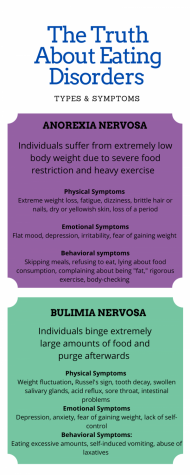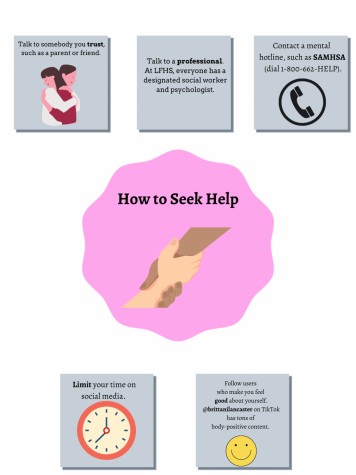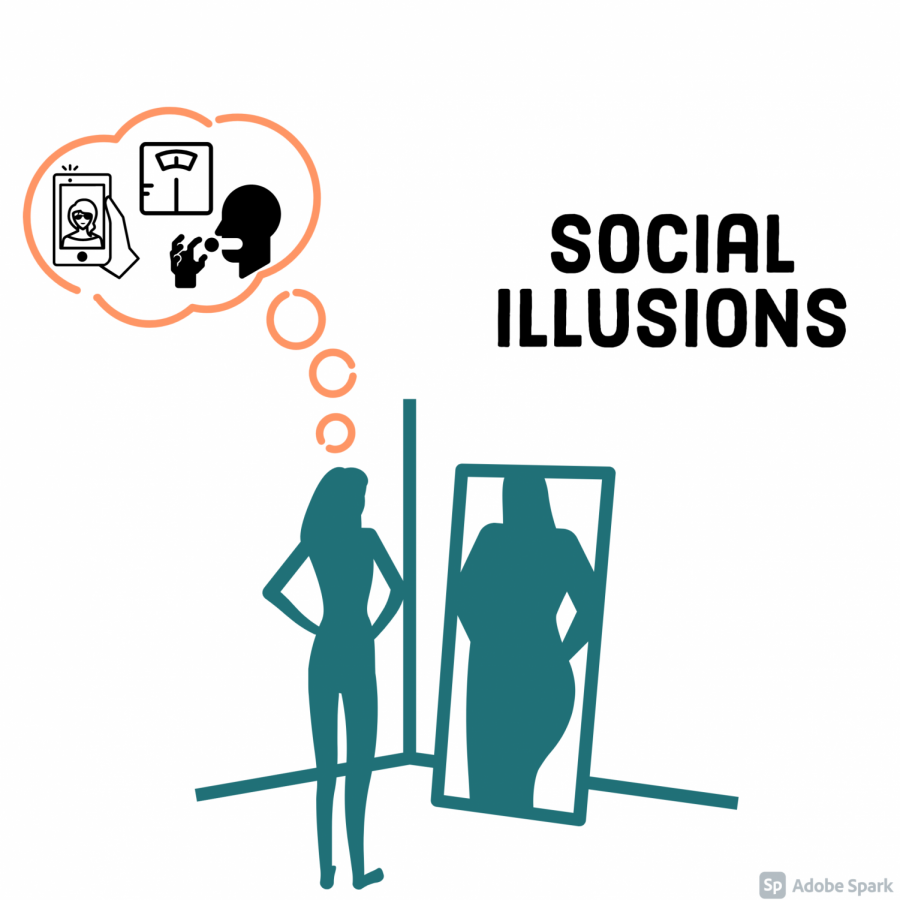Social Illusions: Social media exacerbates relationships with food and body image
Another edition to the Social Illusions series explores how teens feel pressured to conform to unrealistic body standards glamorized by the media
Social Media may be partially responsible for spike in eating disorders.
December 3, 2021
TW: This article, the third in our Social Illusion series, discusses disordered eating, anxiety, and depression.
Eating disorders have been on the rise in recent years. From 2000 to 2006 there was a 3.5% increase, and from 2013 to 2018, a 7.8% increase in eating disorder cases worldwide.
Even more alarming, following the onset of the COVID-19 pandemic, the prevalence and severity of eating disorders grew dramatically. A study by the Journal of Adolescent Health found a significant increase in “ED-related medical hospitalizations, hospital bed-days, and patient/parent inquiries,” demonstrating the serious need of support for individuals with EDs.
The pandemic worsened anxiety and uncertainty in teens, without resources for help. However, as teens were isolated in their homes with nothing to do, the pandemic also initiated a notable rise in social media usage.
Current research fails to conclude a cause-and-effect relationship between social media and eating disorders, but there is a positive correlation between the two variables.
“Social media in general does not cause an eating disorder,” Chelsea Kronengold, a spokeswoman for the National Eating Disorders Association, said. “However, it can contribute to an eating disorder.”
From the glamorization of unattainable body standards and feelings of inadequacy perpetuated by the media, teens may feel pressured to control their eating habits.

Though teens may perceive the bodies on social media as physically “perfect,” the reality is that many of these bodies are not real.
In a recent study by the University of London, 90% of the 175 surveyed women admitted to filter or edit their photos before posting. This includes evening out skin tone, whitening teeth, shaving off weight, and enhancing curves.
With more than 95 million photos shared on Instagram a day, body-morphing apps such as FaceTune and BodyApp are more popular than ever, reinforcing unrealistic body standards for men and women.
“I 100% edit my photos before posting them,” senior mental health advocate Sophie Huddleston said. “I feel the need to edit my photos because the standard for social media has become so high that it would feel wrong posting something casually.”
As teens scroll through facades of physical perfection online, they may turn to strategies much more dangerous than editing apps, such as unhealthy eating behaviors.
“Looking at hundreds of pictures a day where other people are looking their very best is bound to make someone reflect on their own image,” Huddleston said. “As a result, people are willing to take every measure, healthy or not, just to feel a sense of adequacy.”
According to the American Psychiatric Association, eating disorders are characterized by “severe and persistent disturbance in eating behaviors and associated distressing thoughts and emotions.”
There are various types of eating disorders, including Anorexia Nervosa, Bulimia, Binge Eating Disorder, and Avoidant Restrictive Food Intake Disorder. While physical symptoms vary, a person with an eating disorder can be at any weight. In fact, less than 6% of people with eating disorders are underweight.
Social worker Mr. Dan Maigler says eating disorders fall under the umbrella of addiction. While it is difficult to beat any addiction, eating disorders are among the hardest to treat.
“With alcoholism, gambling, with any of those other addictions, we can just cut it out,” he said. “But with eating disorders, you have to eat, and not eat, every single day.”
Though more prominent in women, eating disorders also do not discriminate against gender.
“I know some guys that count their calories and only allow themselves to eat at certain times,” senior Matthew James said. “They will put themselves through a lot of mental and physical pain just so that they can reach their goal.”
Though teens may control their eating to achieve the bodies they see online, ideal body image is a confusing concept, especially for women. The struggle to occupy a perfect body is a fruitless endeavor because a concrete definition of “the perfect body” does not exist.
“The ideal body type that seems to haunt the women in my life is anything but their own body type,” Huddleston said. “I don’t know any woman who is happy with her body, which is devastating.”
Furthermore, eating fixations may arise as a result of the negative emotions that develop from social media usage.
During a process that psychologists call “upward social comparison,” individuals contrast themselves to others they perceive as “better” in terms of attractiveness, wealth, talent, and more. While sometimes inspiring, upward social comparison tends to leave people with feelings of inferiority, anxiety, and depression.
“When boys see this, it can be very damaging to their self-esteem and self confidence,” James said.
In an effort to cope with feelings of constant failure, controlling eating behaviors may provide an illusion of success.
“For some people, their eating issue is not just a behavior that they hate, it is also something that they rely on,” said Maigler.
In addition to fearing the theft of their coping mechanism, the stigma around eating disorders inhibits teens from seeking help.
“As someone who has struggled with all of these problems, there was a long time where I had no one to go to,” James said. “I was afraid no one would take my problems seriously just because I am a boy.”
The idea of speaking up as well as staying committed to a healing process is a daunting one to say the least, but it’s crucial to get help. Eating disorders are among the deadliest mental illnesses and can be lifelong battles, Maigler says.
As teens are overwhelmed with negative thoughts about body image and food in the age of social media, happiness can seem out of reach. Maigler suggests students devote more of their energy into something that is “bigger” than them to feel a greater sense of purpose and satisfaction.
“Whether it’s Paws for Patrick, going to volunteer at Orphans of the Storm, going to Bernie’s Book Bank, doing something that’s bigger than you will help a person fill that emptiness,” Maigler said.









name • Dec 3, 2021 at 11:55 am
Thank you for including information about men who struggle with eating disorders, I feel you were entirely equal in how you talked about this issue. But what really touched me was how you included ARFID (Avoidant Restrictive Food Intake Disorder). It’s something I’ve personally struggled with for a while, and to see, especially at a high school level, people taking notice of it. Makes me feel recognized and understood. I think you did a really great job with not just talking about what eating disorders are, but what can affect them, what can cause them. And how it affects everyone of all sizes and all genders. Eating disorders are uncomfortable to talk about, but you presented the article in a way that is sure to make people feel much more comfortable talking about them. Thank you for this.